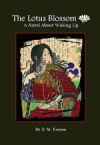Today’s Karmic Workout – The Virtue Of Skillfulness
Today’s Exercise: The Virtue Of Skillfulness
[Author's Note: I founded a company with a friend in 2008. As I developed the business plan, I put a great deal of thought into what a business organization should aspire to cause in its culture. I have had a lot of training in practical organizational behavior and had founded organizations in the past that, at least for a number of years, flourished into exceptional, thoughtful and fulfilling cultures. When I started organizing my company, I wrote a document called The Seven Virtues Of Habitata. I have since posted this document as The Book Of Seven Virtues on this site. The main concept of these operating virtues is that work life, home life and community life should be ethically harmonious and designed to empower each other. If it does not support the life of employees, then a company should not be asking them to do it. This is not just because it is unethical to ask employees to harm themselves, it is bad for business when a company creates harm. Managers many not understand the hidden costs of harmful conduct, but it is there in every case. We run organizations understand this. The fact of the matter is that a person, a family and an organization each have only one life and it should be focused on fulfillment and the creation of benefit for all. Producing profit without this integrity is lazy, short-sided and will ultimately costly.
What I found is that what is good for life generally is good for business specifically. The employees of my company are extraordinary. We have a very diverse group of people that collaborate as a fierce and passionate family. We have some unusual practices at Habitata. Our employees make the final hiring decisions from a pool of qualified candidates based on who they are willing to be responsible for bringing into the family. The selection must be unanimous. If they are not willing to fight for the person in the beginning, then we will not have the type of employee we are looking for. They must be worth taking a stand for.
Our managers cook lunch every Friday for our workers and after lunch the entire company discusses one of the Seven Virtues. We practice high social impact hiring, meaning that we give preference to the chronically unemployed, veterans, felons and others who really need a job. We hire people in their 60's and 70's because we believe that experience is the most valuable trait in an employee. In 2011, after already having to lay off 15% of our employees, we had to make another cut. This time, we cut me, the company's CEO instead of cutting to other employees. Our management does not believe that it is appropriate to allow workers to be treated as "disposable" people and so we made sure that the pain was felt at every level of the company and not just at the bottom. Our employees are so well trained that they can practically run the company without a CEO.
The outcome of these practices is a diverse family of people who believe in what they do and believe in each other. Absenteeism is nearly non-existent. It is not unusual to see employees hanging out hours after their shift is over. We invite all our employees to company networking events and proudly have them explain our company to corporate CEOs and political dignitaries. They frequently leave mayors, congressmen and senators in shock over how our company not only works, but has survived against impossible odds. As we say at Habitata: "the impossible we do right away, miracles take a little longer."
For these next seven workout sessions, I am going to offer the Seven Virtues, one by one, in TLB's traditional exercise format. I hope that you will take them to heart and apply them to your own life. The Virtues are not only the key to right living and fulfillment, they are good business practices that cause truly great, profitable companies to stand out in a cynical world.
You may want to print out the post about the Virtue of Skillfulness and keep it with you during this exercise. It is best to get started on this exercise in the morning.]
Find a quiet place to read and contemplate. Turn off your cellphone. (Come on, actually turn it off. No vibrate, no hoping that it won’t ring. Turn it off as an intentional act to create solitude.)
Establish meditative breathing for 3 minutes. Take long inhales and long exhales of equal length. Relax and clear you mind. It is important to eliminate distraction by creating focus on breath.
Take a moment to read about the fourth virtue, skillfulness, out of The Book of Seven Virtues post (see link above) or you can read just about skillfulness by clicking here.
After you have read about the Virtue of Skillfulness, take 3 minutes to think about how you are going to practice this virtue all day. This will require that you pay attention to what you are actually doing and thinking all day. This will be much harder than you think. We spend a considerable portion of our day steeped in self-concern. Skillfulness requires that you pay attention to how you do things with an eye to improving them. This includes developing your techniques for all manner of things including something simple like chopping lettuce for salad as you prepare dinner.
For the rest of the day, we want to focus our attention on the efficiency and effectiveness of everything you do. We want to be looking for opportunities to improve your ability to do almost anything. Do not wander off. If you do, pull yourself back into your concern for evolving your skills.
To get you started, here is a short instructional video on how to tie your shoes. The odds are you are doing it wrong. Click here.hr]
Training Note:
By now you might have noticed that all of the Seven Virtues are actually different ways to be aware of your world. Usefulness requires that we pay attention to the results of our actions to make sure that they are always providing benefit and, hence, good karma for ourselves and for others. Mindfulness requires that we remain aware of what we are actually doing instead of day-dreaming and creating the opportunity for mishap or misunderstanding. Compassion has us paying attention to the condition of others so that we might be able to provide benefit to them and so that we can tune ourselves to the well-being of all. That brings us to skillfulness. Like usefulness, skillfulness focuses on how we do things. Unlike usefulness, we are not simply looking to provide benefit, but rather, we are seeking to refine effectiveness.
You can do useful things without much skill, but it is skill that helps us refine our technique to maximize potential benefit. It is a wonderful thing to give a person in need a dollar. It is an even better thing to fund a homeless shelter by rallying a community. Skill, like the other virtues, is a path to a certain kind of personal power. The real limitations that we face, however, do not arise from learning how to do things well, but knowing that there is a away to improve everything that we do even when we do not ordinarily associate them with skill. For instance, the practice of mindfulness seems simple and straight forward, but it actually takes considerable practice to develop skill in it. Being skillful at mindfulness actually causes a significant paradigm shift in consciousness that,over time, can have a profound effect on one’s life experience. Likewise, one does not usually consider compassion to be something that requires skill, but quite the opposite is true.
There are only two ways to develop skill: instruction and practice. Skill requires intention. That may explain why people have less and less of it as we wander off into the Information Age.
Karmic Benefits:
Skill Is The Difference Between Medical Voodoo And Brain Surgery: in the ancient times, if you were sick with a brain tumor, a shaman might shake a bone rattle in your direction and insist that you be healed. Today, we have brain surgery. While the rattle technique was relatively quick to learn, it was ineffective. Brain surgery takes a long time to learn, but works very well. This is a fundamental truth about skill. first it is the study of something in its complexity. Later, it is the reduction of this complexity to simple, intuitive practice. It takes time to work through the critical thinking of a skill and then sharpen your technique. Concert pianists are constantly refining their skills even though they all start out playing “Chopsticks”.
Everything You Do Can Be Done Better: there is no human activity on the planet that cannot be done better with some critical thinking and practice. This includes things like parenting, listening, meditating and even sleeping. We spend much of our time in mental oblivion which deprives us of the opportunity to develop virtuosity in even the simplest things. Samurai could shoot arrows through rice paper and hit small targets that they intuitively located through clear mindedness. They usually also were accomplished in a wide variety of arts in their quest to evolve a refined and gracious life experience. Skill does not come by accident. It can only be honed with intention.
Awareness Of Critical Distinctions Is The Key To Mastery: regardless of the skill, the difference between a novice and a master is a matter of being aware of increasingly complex distinctions. A novice baseball player knows about a bat and a ball and swats at pitches as they streak by. A master, however, knows about nuances of stance and swing and may have trained his eyes to become cognizant of all twelve pictures per second that the human eye takes rather than the six or eight that the normal person might notice. To the novice, a fastball looks like a streak of white; to a master, he can see the individual threads of the ball even at 90 miles per hour.
It May Be Fiction, But It Is One Heck Of A Karmic Workout.
 Read The Lotus Blossom, D. M. Kenyon’s fictional account of a teenage girl who turns off her cellphone and enters the very real, but mystical world of Budo warriors. Humorous, irreverent and heart-wrenching, The Lotus Blossom is an unforgettable tale of a Midwestern teenage girl’s transformation into a budo warrior in the midst of the turmoil of the Information Age. Available in all digital formats, paperback and soon to be released in hardcover.
Read The Lotus Blossom, D. M. Kenyon’s fictional account of a teenage girl who turns off her cellphone and enters the very real, but mystical world of Budo warriors. Humorous, irreverent and heart-wrenching, The Lotus Blossom is an unforgettable tale of a Midwestern teenage girl’s transformation into a budo warrior in the midst of the turmoil of the Information Age. Available in all digital formats, paperback and soon to be released in hardcover.
Available at : Amazon.com Smashwords.com Barnes & Noble
Share Your Experience:
Leave a comment when you have completed the exercise.
Enter your email address to subscribe to TLB’s Daily Karmic Workout:
Delivered by FeedBurner








